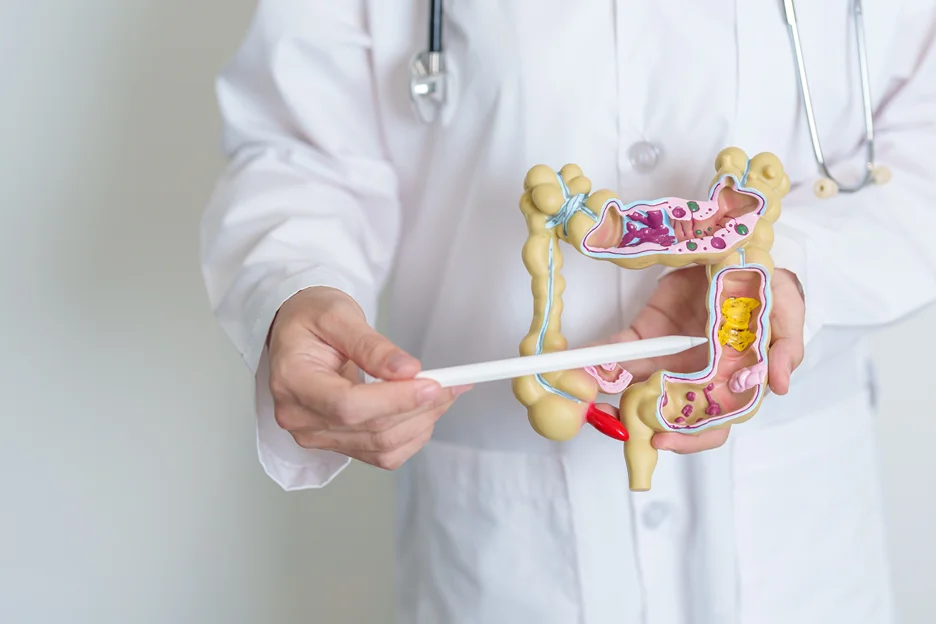If you’re one of the million Americans living with ulcerative colitis, you know that a flare-up can derail your life in an instant. The abdominal cramping, diarrhea, and other unpleasant gastrointestinal symptoms make it difficult to work, socialize, or even leave the house.
While there are medications that induce remission, they come with side effects. You may wonder if there are better ways to find relief during a flare while addressing the root causes.
New research shows that diamine oxidase (DAO) supplements may help significantly reduce symptoms and improve the quality of life for those with inflammatory bowel diseases like ulcerative colitis.
DAO helps degrade histamine, a compound that triggers inflammation when it builds up in the body. By supporting your body’s histamine regulation, DAO provides a natural way to calm colon inflammation and gut irritability when you need it most.
Causes of Ulcerative Colitis
Ulcerative colitis (UC) is a chronic, inflammatory bowel disease (IBD) that affects the large intestine or colon. It’s characterized by sores and irritation along the inner intestinal lining, leading to symptoms like frequent diarrhea, abdominal pain, rectal bleeding, and urgent bowel movements.
What causes the colon inflammation in the first place? The exact mechanisms are still unclear, but it likely involves:
Genetics
If someone in your family has had issues related to colon inflammation, it might be worth noting. Certain gene mutations can influence how our immune system functions, potentially increasing the likelihood of inflammation.
Immune System Dysfunction
While our immune system is usually our defender against harmful invaders, sometimes it gets a bit overenthusiastic. Instead of just targeting harmful bacteria, it might mistakenly target the beneficial bacteria in our gut, leading to inflammation.
Microbiome Imbalance
Our gut is like a bustling city of bacteria, all working to keep our digestion smooth. But if the balance gets tipped – maybe too many “bad” bacteria and not enough “good” ones – our colon can get irritated, causing inflammation.
Environmental Factors
Everything from the food we eat to the stress we experience can impact our gut health. Diets rich in processed foods or constant exposure to stressful situations can be culprits in causing colon inflammation. It’s always good to be mindful of what we’re feeding our body and mind.
Your body overreacts to normal gut bacteria and fires up the immune system to attack the colon. Chronic inflammation and ulcers interfere with the colon’s ability to absorb water, nutrients, and electrolytes properly.
Diagnosis of Ulcerative Colitis

UC is closely related to Crohn’s disease, another type of IBD. However, Crohn’s can affect any part of the gastrointestinal tract while UC targets just the large intestine. Getting an accurate diagnosis is crucial, as treatment plans differ between the two conditions.
If you have persisting digestive symptoms, your doctor will likely order tests like:
| Test | Description |
| Colonoscopy | A tiny camera on the end of a flexible tube is used to examine the entire colon. |
| Biopsy | A tissue sample is taken to check for inflammation and abnormalities. |
| Stool Analysis | This test checks for elements like blood, infections, mucus, or a high white blood cell count in the stool sample. |
| CT Scan | This is a highly detailed imaging technique that visualizes the colon, helping to identify areas of inflammation. |
| Blood Tests | Specific markers, such as high CRP, are checked to determine systemic inflammation. |
Identifying any triggers, relievers, and the severity of your symptoms can also clarify the diagnosis. Keeping a symptom journal is invaluable during the evaluation process.
Once inflammatory bowel disease is confirmed, you and your doctor can develop a treatment plan to induce remission during flare-ups while managing the condition long-term.
The Role of Histamine and Diamine Oxidase in Inflammation
You’re probably familiar with histamine as the culprit behind allergic reactions, hives, runny noses, and itchy eyes. But did you know that excess histamine drives inflammation throughout the body?
Histamine is produced by immune cells like basophils and mast cells. It acts as a vital inflammatory signal, calling other immune defenders into action against perceived threats. Normally, histamine gets broken down by enzymes like diamine oxidase (DAO) after doing its job, preventing an overreaction.
However, when histamine accumulates faster than DAO can degrade it, you may experience:
| Symptom Category | Description |
| Digestive Issues | Altered gut motility can disrupt the normal digestive process, leading to symptoms such as diarrhea and nausea. This can be uncomfortable and can interfere with daily activities. |
| Sinus Congestion | Excessive histamine can cause symptoms like an itchy or runny nose and sneezing, indicating an overreactive response in the nasal passages. |
| Skin Reactions | Histamine is well-known for causing skin reactions. Hives or eczema can emerge, reflecting the body’s external response to the internal histamine build-up. |
| Brain Fog | An overload of histamine might cloud cognitive functions. This could result in impaired cognition and headaches, making focusing and processing information challenging. |
| Racing Heart | When histamine levels rise, heart palpitations or irregular heart rhythms (arrhythmias) can occur, leading to feelings of a racing or fluttering heart. |
| Mood Disturbances | High histamine can affect our nervous system. This might manifest as heightened anxiety levels or disrupted sleep patterns, like insomnia. |
| Joint Issues | Histamine’s inflammatory properties can target the joints, causing pain and inflammation, making movement more painful and restricted. |
For those with IBD, histamine intolerance is a major trigger for flare-ups and symptom exacerbation. The chronic intestinal inflammation depletes DAO activity, causing excess histamine to accumulate. This further aggravates the intestinal lining, creating a snowball effect.
Optimizing your DAO activity is essential to short circuit this inflammatory cycle and manage UC flares. Emerging research shows just how powerful DAO supplementation can be.
The Link Between DAO and Ulcerative Colitis
Histamine is a compound that plays a pivotal role in our body’s inflammatory responses. When we think of histamine, allergic reactions might come to mind, but its influence stretches far beyond that. Histamine’s interaction within our gastrointestinal tract, in particular, merits attention.
The Histamine-H2 Receptor Connection
In our gastrointestinal tract, histamine predominantly interacts with H2 receptors. These receptors are abundantly found in stomach cells that release acid. Through this interaction, histamine helps regulate the acid’s release, aiding in digestion.
The Terrain of Histamine Overload
Sometimes, our bodies end up with too much histamine. This situation, termed as histamine intolerance, arises when our bodies aren’t breaking down histamine efficiently. And remember, histamine isn’t just about allergies. It’s deeply involved in a variety of inflammatory responses.
Zooming in on DAO: Our Histamine Regulator
Enter diamine oxidase (DAO), our body’s primary enzyme for breaking down histamine. Under normal conditions, DAO ensures that histamine is metabolized and kept in check. However, if DAO levels dip or its activity falters, we could end up with accumulating histamine, setting the stage for potential inflammation.
UC Patients and the DAO Challenge
Ulcerative colitis (UC) inflicts pronounced inflammation in the colon and rectum. This inflammation can potentially impact DAO’s performance, hampering its ability to regulate histamine. For someone with UC, decreased DAO activity can lead to mounting histamine levels, potentially intensifying the inflammatory response and worsening UC symptoms.
The Inflammation-DAO Feedback Loop
Here’s where things get particularly tricky for UC patients. The inflammation characteristic of UC might further stifle DAO, setting off a feedback loop. With heightened inflammation comes diminished DAO activity and vice versa, leading to more histamine and subsequently more inflammation. Breaking this cycle could be pivotal in effectively managing UC.
The Potential Role of DAO Supplements in Ulcerative Colitis Management
DAO, short for diamine oxidase, is more than just an enzyme in our body. It serves as a crucial gatekeeper, regulating histamine levels, which play an important role in inflammation—a key feature of Ulcerative Colitis (UC).
But, in scenarios where DAO is either insufficient or its activity is hindered, histamine can accumulate. For UC patients, the inflammation characteristic of their condition can further hamper DAO’s efficiency, leading to even more histamine buildup.
DAO Supplements: A Potential Ally for UC Patients
Introducing DAO supplements could be a strategy for UC patients. By boosting DAO levels, there’s a potential to enhance histamine breakdown, possibly curbing histamine intolerance, mitigating inflammation, and providing relief from UC symptoms.
A Comprehensive Approach to UC Management
DAO supplements, while promising, are not a standalone solution for UC. Managing UC often requires a multifaceted approach, encompassing dietary changes, prescribed medications, and potentially a mix of other supplements.
Dietary Choices to Complement DAO Activity
While DAO supplements can help degrade excess histamine, reducing histamine intake through diet is also crucial. Many foods naturally contain high levels of histamine or trigger its release:
Histamine-Rich Foods to Be Cautious With
Several foods are naturally rich in histamine or can prompt its release. Examples include:
- Fermented and aged delights: Think aged cheese, yogurt, vinegar, and even those tasty pickles.
- Reheated meats: Fresh is best!
- Processed favorites: The likes of salami, hot dogs, and some lunch meats.
- A toast too far? Alcohol, notably wine or champagne.
- Some fruits and veggies: The usual suspects are avocados, spinach, tomatoes, and strawberries.
- Seafood specials: Shellfish, sardines, and certain fishes like mackerel.
- Add-ins and additives: Various sweeteners, sulfites, and nitrites.
Consuming these on a regular basis adds more histamine burden than DAO can keep up with. An elimination diet removing high histamine foods provides fast relief for many IBD patients.
Diets to Calm the Gut
Anti-inflammatory diets are gaining traction as beneficial for gut health. The low FODMAP diet is one such approach, targeting:
- Fermentable oligosaccharides
- Disaccharides like lactose
- Monosaccharides such as fructose
- And polyols, including sorbitol and mannitol.
The specific carbohydrates diet (SCD) takes it a step further by removing complex carbs that feed harmful gut bacteria. An elemental diet with meal replacements low in fiber, fat, and lactose allows the gut to fully rest and heal. Work with a registered dietitian knowledgeable in IBD to personalize your dietary approach.
Enhancing Remission Through Lifestyle Choices
Dietary considerations and DAO activity certainly have a say in managing symptoms, but embracing holistic lifestyle changes can pave the way to lasting remission.
Strategies for Sustainable Remission:
- Stress Management: Embrace relaxation techniques such as meditation, yoga, or simply spending quality time in nature. Remember, chronic stress can be a silent accomplice to prolonged inflammation.
- Active Living: Incorporate a mix of cardiovascular and strength-training exercises into your routine. Regular physical activity has shown promising results in diminishing inflammation markers.
- Restorative Sleep: Aim for 7-9 hours of undisturbed sleep nightly. A well-rested body ensures the gut remains at peace, keeping inflammation at bay.
- Friendly Bacteria Boost: Consider adding probiotics to your regimen. When shopping, opt for multi-strain products that are shelf-stable.
- Plant Power: Include a variety of green-leafy vegetables in your diet. These come loaded with polyphenols and antioxidants, which not only nourish our cells but also our gut’s beneficial bacteria.
- Stay Hydrated: Aim for 2-3 liters of filtered water daily. Remember, dehydration is not a friend to our gastrointestinal health.
- Break Up with Smoking: Smoking affects the gut’s protective barrier. Bidding adieu to cigarettes can significantly benefit your gut health.
- Mindful Medication: Limit the use of NSAIDs. While they might alleviate pain, they can be a tad harsh on the gut lining.
FAQs: Diamine Oxidase & Ulcerative Colitis
What is the connection between Ulcerative Colitis and Diamine Oxidase (DAO)?
Ulcerative colitis, a form of inflammatory bowel disease, can lead to inflammation of the intestinal mucosa. DAO plays a critical role in breaking down histamine in the body. When the activity of diamine oxidase is disrupted, it can result in an accumulation of histamine, which can exacerbate the symptoms of ulcerative colitis.
How do histamine intolerance and ulcerative colitis relate?
Histamine intolerance arises when there’s an imbalance between the release of histamine and its breakdown, often due to reduced diamine oxidase activities. This can cause symptoms that mirror or exacerbate those of ulcerative colitis, such as inflammation in the gastrointestinal tract.
Are there any studies about DAO supplements aiding UC patients?
Yes, there have been clinical studies and prospective studies that have explored the impact of DAO supplements on disease activity in UC patients. However, it’s essential to consult a healthcare professional before making any decisions based on these findings.
How does diet affect UC and histamine levels?
Certain histamine-rich foods can elevate histamine levels in the body, potentially worsening symptoms of histamine intolerance and ulcerative colitis. Following a diet that avoids these triggers, and potentially includes DAO supplements, might help manage these symptoms.
Can stress influence UC and histamine intolerance?
Chronic stress can exacerbate gastrointestinal diseases like UC, and potentially impact the body’s diamine oxidase activities, leading to a buildup of histamine. Managing stress through relaxation techniques can be beneficial.
Take Control of Your Ulcerative Colitis with DAO

If you are looking to get to the root of your ulcerative colitis and gut inflammation, addressing histamine intolerance is a critical first step. Combining targeted DAO supplementation with dietary changes gives your body the support it needs to minimize symptoms, reduce flare-ups, and feel your best.
SeeBeyond Shop provides high-quality DAO Hist supplements made from only natural sources. Their specialized formula contains both DAO enzyme and vitamin B6, which plays a key role in amine oxidase function.
Visit SeeBeyondShop.com to learn more or speak with their nutrition experts about creating a personalized plan for your UC management. Get evidence-based guidance on DAO dosage, optimal diet approaches, and complementary lifestyle changes to support your gut and whole-body health.
